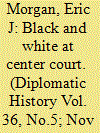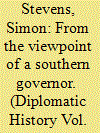| Srl | Item |
| 1 |
ID:
121169


|
|
|
|
|
| Publication |
2012.
|
| Summary/Abstract |
At a time when both the internal and global movements against apartheid in South Africa were at low ebb, African-American tennis star Arthur Ashe was successful in focusing the attention of the American public, the Nixon White House, and the international sporting community on South Africa. Ashe was also able to focus the attention of the South African government on the concerns of the anti-apartheid movement. Through his confrontation of apartheid, Ashe also underlined the anti-apartheid movement's struggle over how best to confront South Africa, through engagement or isolation. While Ashe strove to visit South Africa, other forces within the anti-apartheid movement championed boycotts and protests. These two competing visions led to much strife within the movement, and were an important component of the international debate over how to deal with apartheid and racial injustice in South Africa. Ashe traveled across several borders-both real and imagined-to emerge as a crucial transnational actor within the anti-apartheid movement in the early 1970s.
|
|
|
|
|
|
|
|
|
|
|
|
|
|
|
|
| 2 |
ID:
121171


|
|
|
|
|
| Publication |
2012.
|
| Summary/Abstract |
Jack O'Connell, who served as CIA Station Chief in Jordan between 1963 and 1971, was a unique and remarkable figure in the contemporary history of United States involvement in the Middle East. He established a closer personal relationship with King Hussein than any other foreigner before or since. Subsequently he went on to serve as the King's attorney-at-law in the United States and as his informal diplomatic adviser. This article explores O'Connell's role as CIA Station Chief, focusing in particular on his account of the events leading up to the outbreak of the 1967 war and of the covert diplomacy which followed it. It concludes that if O'Connell's claims are sustained, the United States must bear a greater share of responsibility for failing to prevent the outbreak of war and for the failure to secure a diplomatic settlement in its aftermath than has hitherto been acknowledged.
|
|
|
|
|
|
|
|
|
|
|
|
|
|
|
|
| 3 |
ID:
121170


|
|
|
|
|
| Publication |
2012.
|
| Summary/Abstract |
The Carter administration's adoption of an approach towards the South African government's policy of apartheid that was, as Jimmy Carter put it, "correct but as easy on them as possible," cannot be explained solely by American economic and strategic interests in the region or by the administration's desire for South Africa's cooperation on nuclear nonproliferation and the resolution of the conflicts in neighboring Rhodesia and Namibia. The lessons Carter and Ambassador to the United Nations Andrew Young drew from their earlier personal experiences in the American South in the 1960s were also of great significance. Those experiences not only gave Carter and Young a strong commitment to ending apartheid in South Africa but also strongly influenced the ways in which they thought that objective might be achieved. First, Carter and Young had considerable sympathy for the position of white South Africans and were concerned to work with them toward peaceful change in a spirit of cooperation rather than confrontation. Second, they believed that American businesses could have a positive impact on race relations in South Africa. They therefore encouraged American investors to adopt "enlightened employment practices," and resisted pressure from anti-apartheid activists to impose economic sanctions.
|
|
|
|
|
|
|
|
|
|
|
|
|
|
|
|